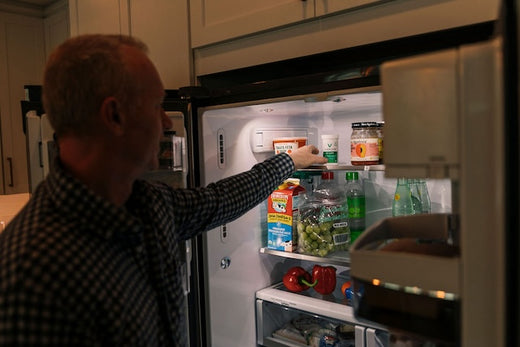In This Article
Share On
The use of probiotics in clinical settings is becoming increasingly common for a variety of medical conditions. If you use probiotics yourself, you may notice that most reputable probiotics are refrigerated. But do probiotics need to be refrigerated? The short answer is yes; probiotics need to be refrigerated, not only on the shelves of the stores but during the whole shipping process. Let's see why. 
The Key Challenge: Keep the bacteria alive
The active component of any probiotic is the actual living bacterial strain or strains. The secret many probiotic companies don’t like to discuss is that most probiotic bacteria will die if they are exposed to excessive heat. Even long-term exposure to room temperature conditions will adversely impact most probiotic strains. The key to the beneficial impact of these products is that the bacteria need to be alive. This is why several stores have dedicated refrigerators just for their probiotic products.
Many of the leading products on the market claim to be “shelf stable” at room temperature. The risk in taking probiotics stored at room temperature is that you will have no idea how the heat may have impacted the viability of the bacteria while on the shelf or, more importantly, during the shipping process. Even if your air-conditioned office is cool enough to store some probiotics, the temperatures associated with distributing and shipping these products to many areas throughout the country are likely to damage them.
High Temperatures During Shipping
Temperature exposure to packages sent by common carriers like UPS, FedEx, and the US Post Office will vary greatly depending on the time of year and geography. For example, a probiotic shipped by UPS in January from Detroit to Chicago is unlikely to be exposed to excessive heat in transit. However, a probiotic shipped during the summer or to southern parts of the country will be much more at risk.
One study (Shallenberger, et al. 2015) analyzed the variable temperature exposure of certain medical packages shipped from Montana to six “warm climate” U.S. Cities (Phoenix, Tampa, New Orleans, Los Angeles, El Paso, Dallas) using variable shipping carriers and methods (2-day air, Next Day Air). Three major U.S. carriers (FedEx, UPS, USPS) transported 72 individual shipments throughout August and September. The products were shipped without any form of insulation or cooling source[1].
The results showed that products shipped in warmer months with no external cooling or insulation will be exposed to high ambient temperatures. The data also show that packages were routinely exposed to temperature “spikes” when placed on planes or local delivery trucks. These temperatures spikes frequently exceeded 104°F (40°C), which are temperatures that will quickly kill even hearty probiotic bacteria. During the study, the 72 packages recorded internal maximum temperatures ranging from a low of 76°F (24.6°C) to a high of 118°F (47.9°C). From this data, we can easily conclude that if probiotics are shipped without a cooling source and insulation, particularly in the warmer parts of the US, they will likely be compromised in shipping and rendered useless for the patient.
How should probiotics be shipped?
While there are dozens of probiotics products available in health stores and online, only a handful of products are actively being utilized in clinics. The safest way to ensure that these products have not been compromised in the storage or transportation process is to choose a product which is stored and shipped under controlled, refrigerated conditions. When one considers the potential impact of temperature spikes during shipping, the shipping issue should be of particular concern for those suffering from serious gastrointestinal disorders.
ExeGi Pharma is the maker of the Visbiome high potency probiotic, which is an 8-strain probiotic blend available in doses of 112.5, 450, and 900 billion live bacteria per dose. This product must be stored under refrigerated condition. ExeGi ships Visbiome via 2-Day Air express service using 100% curbside recyclable coolers with two frozen gel cold packs. The purpose of including insulation, cooling components, and express delivery with orders is to ensure that the product is not exposed to elevated temperature spikes of more than 86°F.
The Visbiome strains can be exposed to warm conditions for brief periods of time and are even stable at room temperature for up to a week. Unfortunately, temperature spikes above 86°F will begin to degrade the living bacteria, a phenomenon potentially present in competing products. As an added assurance of product integrity, ExeGi adds a temperature sensor device to every shipment. If the product is exposed to unacceptable temperature ranges, even for a short period of time, the monitor will be activated and turn red. In the unusual event that this occurs, the manufacturer will replace the product free of charge. The inclusion of these temperature monitors is so important that, in addition to including these measures in their own shipment, the manufacturer also requires any third-party internet retailers of the product to use the devices, insulation, and gel packs in their shipping process.

In conclusion, probiotics need to be refrigerated because the bacteria are sensitive to heat, and reputable makers of human probiotics have shifted to a “Cold-Chain” storage and shipping method to protect their products before they are taken. Today, Visbiome is one of the major probiotic brands that is properly controlled for temperature exposure both during long term storage and shipping of the product. Ideally this will become industry standard, but for the meantime, it is crucial to be aware of which probiotics have their integrity protected from the heat and which do not.
Key Takeaways
- Probiotics should contain viable living bacteria in colony forming unit counts high enough to alter the gut flora.
- Probiotic bacteria can be inactivated by excessive temperatures, which are common for packages delivered by major carriers such as FedEx, UPS and USPS.
- Any probiotic product shipped via FedEx, UPS and USPS during the summer months to the southern part of the U.S. is likely to be exposed to temperature spikes which could inactivate probiotic bacteria
- The Visbiome brand is shipped using insulated coolers, gel cold packs, standard 2-day express shipping, and temperature monitoring device to ensure product integrity.
For a printable version of this article, click here.
[1] Schallenerger, et al. The effect of temperature exposure during shipment on a commercially available demineralized bone matrix putty. Cell Tissue Bank (2016) 17:677-687



